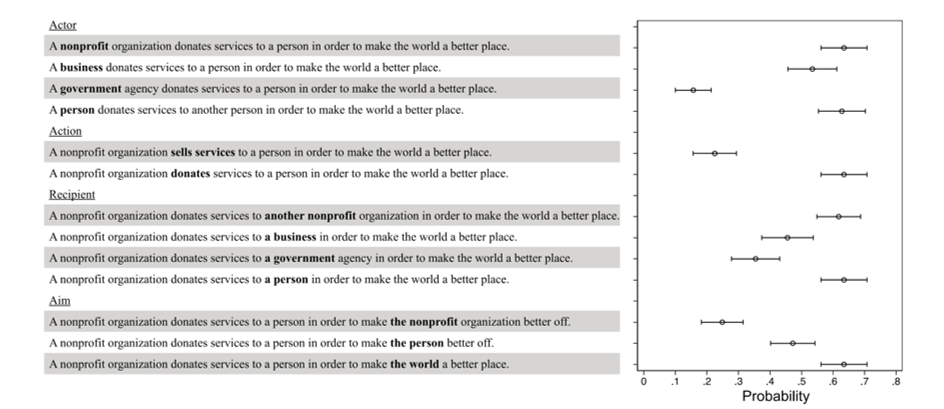Nonprofit-ness?
What makes a nonprofit a nonprofit?
Is it the tax designation, its actions, its beneficiary or its aim?
Academics and professionals in the field likely have sharp lines drawn between different actors, be it businesses, government, traditional, tax status defined charities and the growing 4th sector of social enterprise and entrepreneurship that often sidestep 501(c)(3)s.
But what about regular people, you know, our donors who don’t live and breathe our world and give us and our role only a tiny fraction of their mental energy? How do they view nonprofits?
Regular people deem things to be “nonprofit and charitable” based on the what and why, not the entity or actor doing the deed.
This research broke down charitable activity to Actor, Action, Recipient and Aim to determine the degree to which each influences what regular folks consider charitable and nonprofit-y.
Here are the main takeaways from this first chart.
- The Actors who do charitable stuff include nonprofits (phew), businesses and people, not governments.
- Charities that sell stuff are not being charitable and nonprofit-y in the eyes of lay people.
- Charities are seen as much more charitable when they aren’t partnering with business or government and instead doing so with other nonprofits.
- Nonprofits are much more charitable with big picture “why” vs. little picture “why” – e.g. making world better place beats making the beneficiary person better off.

This research argues that the public sees Nonprofit as a verb – call it nonprofitness”. It’s about actions and aims, not the entity. This is foreboding. Consider the 4th Actor in that list – a person donating services to another person to make the world a better place. This is on equal footing as being nonprofit-y and charitable as the traditional nonprofit as Actor. And business as Actor ain’t far behind.
The people helping people is the 4th sector of social enterprise and disintermediation. It’s always been there – people helping people informally – but it’s becoming bigger, more structured, more topical. And it already has equal footing as nonprofitness in the eyes of the public.
Kevin



I wonder if this is due at least in part to the ubiquity and power of social media, mobile apps, and tech in general. When you have people able to put up their own pages for donation or funding (for all kinds of reasons) via an app, and then easily share it via social – maybe that starts to change the public mindset about how we can best help others.
In other words, people might feel in such cases as if they’ve “cut out the middle man” and donated directly to the beneficiary. They might start to think nonprofits are not so necessary. Just speculating, of course… but if there’s any truth in this speculation, I suppose we’ll probably keep trending in this troubling direction.